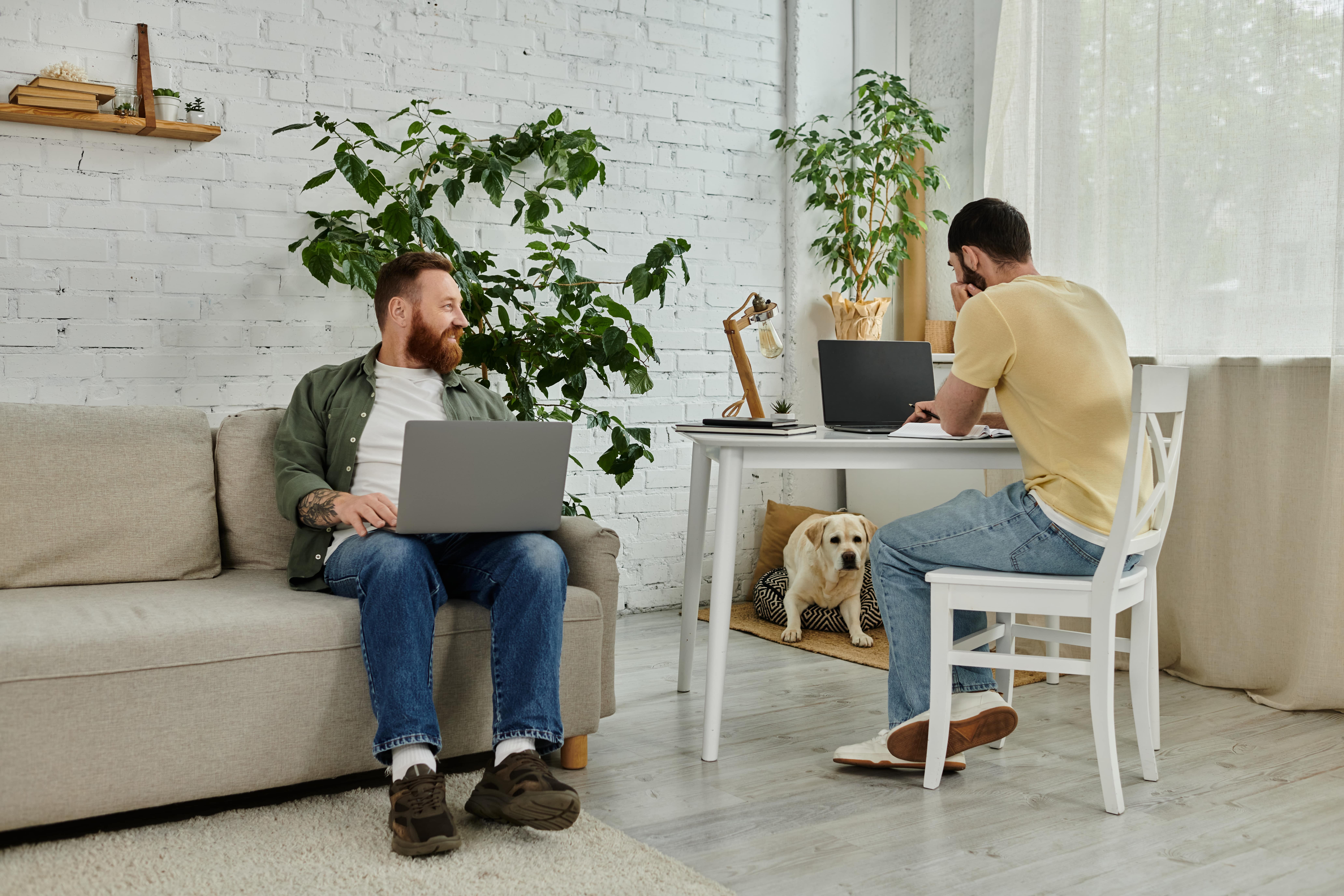

The pandemic forced us into our living rooms, bedrooms, and makeshift spaces - the home office. For some, it was a dream come true. No more crowded commutes or awkward elevator rides. For others, it felt like a prison; endless Zoom calls, the never-ending laundry pile, and the temptation of the couch calling your name. Now that we’re settling into a new normal, it begs the question: Is the home office the future of work, or does the HQ still have the edge?
In this head-to-head, we’re putting the two contenders against each other. The home office has its perks, but is it really the productivity powerhouse it claims to be? On the flip side, the HQ has long been the standard, but does it still provide the same advantages in today’s hybrid world?
Let’s dive into the good, the bad, and the ugly of both setups to determine who wins.
The home office has been the hero of flexibility. No rigid 9-5 structure, no dress code (unless you count "business on top, pajama party on the bottom"), and the luxury of working from the comfort of your own space. Want to take a walk in the middle of the day or start your day with a cup of coffee in bed? Go ahead, no one's stopping you.
But, let’s not forget the downside. Flexibility can quickly turn into work-life blur. Without a set start and finish time, it’s easy to find yourself working late into the night, trying to “catch up” on everything. The line between work and home can get uncomfortably thin. And the occasional temptation of Netflix or an impromptu nap? It’s real.
Winner: Home Office – for flexibility, without a doubt. But the price? Self-discipline.
There’s no denying the power of face-to-face communication. The HQ wins this round for its social energy. Casual water cooler chats, brainstorming sessions in conference rooms, and spontaneous collaborations all contribute to building stronger team bonds. It’s not just the work that happens in the office; it’s the sense of camaraderie, shared goals, and even the unspoken moments of connection. This is often what home offices lack; a sense of being part of something bigger.
But, and here’s the big “but”, if your office culture isn’t already inclusive or collaborative, being in the same building doesn’t automatically create that magic. Long hours in meetings, commuting, and office politics can also wear you down. Plus, if you're in an open-plan office, good luck finding peace and quiet when you need it most.
Winner: HQ – for those spontaneous moments and the power of in-person collaboration.
Home offices come with a superpower: control over your environment. You choose the temperature, the lighting, and the ambiance. You can blast your favorite playlist or enjoy the peaceful sound of silence. And let’s not forget: no distractions from colleagues popping by your desk or loud meeting rooms. It’s all about focusing on your own terms.
The flip side, however, is that working from home often means more distractions that you don’t find in the office. The laundry, the dishes, the allure of your bed, it's all just a few steps away. You’re also likely to have fewer clear boundaries, and even though you’ve got flexibility, it might make it harder to keep your work focused and organized.
Winner: Home Office – when it comes to control, it’s tough to beat the home setup for a focused, personalized environment.

Sure, working remotely means you can connect with your team via Zoom, Slack, and email, but nothing beats face-to-face collaboration. The HQ wins when it comes to quick, spontaneous brainstorming and collaborative energy. Want to hash out a new idea? It's easier to pop into someone's office or chat over coffee.
However, while collaboration in-person can be highly productive, it’s also more prone to interruptions. Those "quick chats" that seem harmless can take a significant chunk out of your day.
Winner: HQ – for those impromptu ideas and creative sparks that often happen organically in the office.
This is where the home office shines the most, especially in today’s world. If you’re a parent, a caretaker, or someone who thrives on autonomy, being able to work from home makes all the difference. No commute means more time for you, whether it’s for personal errands, more sleep, or spending time with family.
The challenge here, however, is not all employees thrive with this level of autonomy. Some people struggle with the lack of structure and find it hard to "switch off." It’s easy to feel isolated or disconnected without the physical presence of colleagues.
Winner: Home Office – especially for flexibility in balancing work and life.
So, who wins in the battle of the home office versus the HQ? It depends.
If you crave flexibility, control over your workspace, and work-life balance, the home office is your winner. However, if you thrive on collaboration, face-to-face interactions, and spontaneous teamwork, the HQ has the upper hand.
In truth, the ideal situation for most people is a hybrid model, where you can enjoy the benefits of both. The home office for the flexibility and focus, the HQ for the social connection and collaboration.
At the end of the day, the winner is the one that suits your personal work style and what you value most. The most successful workplaces will be those that offer flexibility while maintaining strong connections with their teams, because, as we’ve learned, there’s no one-size-fits-all solution.

The pandemic forced us into our living rooms, bedrooms, and makeshift spaces - the home office. For some, it was a dream come true. No more crowded commutes or awkward elevator rides. For others, it felt like a prison; endless Zoom calls, the never-ending laundry pile, and the temptation of the couch calling your name. Now that we’re settling into a new normal, it begs the question: Is the home office the future of work, or does the HQ still have the edge?
In this head-to-head, we’re putting the two contenders against each other. The home office has its perks, but is it really the productivity powerhouse it claims to be? On the flip side, the HQ has long been the standard, but does it still provide the same advantages in today’s hybrid world?
Let’s dive into the good, the bad, and the ugly of both setups to determine who wins.
The home office has been the hero of flexibility. No rigid 9-5 structure, no dress code (unless you count "business on top, pajama party on the bottom"), and the luxury of working from the comfort of your own space. Want to take a walk in the middle of the day or start your day with a cup of coffee in bed? Go ahead, no one's stopping you.
But, let’s not forget the downside. Flexibility can quickly turn into work-life blur. Without a set start and finish time, it’s easy to find yourself working late into the night, trying to “catch up” on everything. The line between work and home can get uncomfortably thin. And the occasional temptation of Netflix or an impromptu nap? It’s real.
Winner: Home Office – for flexibility, without a doubt. But the price? Self-discipline.
There’s no denying the power of face-to-face communication. The HQ wins this round for its social energy. Casual water cooler chats, brainstorming sessions in conference rooms, and spontaneous collaborations all contribute to building stronger team bonds. It’s not just the work that happens in the office; it’s the sense of camaraderie, shared goals, and even the unspoken moments of connection. This is often what home offices lack; a sense of being part of something bigger.
But, and here’s the big “but”, if your office culture isn’t already inclusive or collaborative, being in the same building doesn’t automatically create that magic. Long hours in meetings, commuting, and office politics can also wear you down. Plus, if you're in an open-plan office, good luck finding peace and quiet when you need it most.
Winner: HQ – for those spontaneous moments and the power of in-person collaboration.
Home offices come with a superpower: control over your environment. You choose the temperature, the lighting, and the ambiance. You can blast your favorite playlist or enjoy the peaceful sound of silence. And let’s not forget: no distractions from colleagues popping by your desk or loud meeting rooms. It’s all about focusing on your own terms.
The flip side, however, is that working from home often means more distractions that you don’t find in the office. The laundry, the dishes, the allure of your bed, it's all just a few steps away. You’re also likely to have fewer clear boundaries, and even though you’ve got flexibility, it might make it harder to keep your work focused and organized.
Winner: Home Office – when it comes to control, it’s tough to beat the home setup for a focused, personalized environment.

Sure, working remotely means you can connect with your team via Zoom, Slack, and email, but nothing beats face-to-face collaboration. The HQ wins when it comes to quick, spontaneous brainstorming and collaborative energy. Want to hash out a new idea? It's easier to pop into someone's office or chat over coffee.
However, while collaboration in-person can be highly productive, it’s also more prone to interruptions. Those "quick chats" that seem harmless can take a significant chunk out of your day.
Winner: HQ – for those impromptu ideas and creative sparks that often happen organically in the office.
This is where the home office shines the most, especially in today’s world. If you’re a parent, a caretaker, or someone who thrives on autonomy, being able to work from home makes all the difference. No commute means more time for you, whether it’s for personal errands, more sleep, or spending time with family.
The challenge here, however, is not all employees thrive with this level of autonomy. Some people struggle with the lack of structure and find it hard to "switch off." It’s easy to feel isolated or disconnected without the physical presence of colleagues.
Winner: Home Office – especially for flexibility in balancing work and life.
So, who wins in the battle of the home office versus the HQ? It depends.
If you crave flexibility, control over your workspace, and work-life balance, the home office is your winner. However, if you thrive on collaboration, face-to-face interactions, and spontaneous teamwork, the HQ has the upper hand.
In truth, the ideal situation for most people is a hybrid model, where you can enjoy the benefits of both. The home office for the flexibility and focus, the HQ for the social connection and collaboration.
At the end of the day, the winner is the one that suits your personal work style and what you value most. The most successful workplaces will be those that offer flexibility while maintaining strong connections with their teams, because, as we’ve learned, there’s no one-size-fits-all solution.